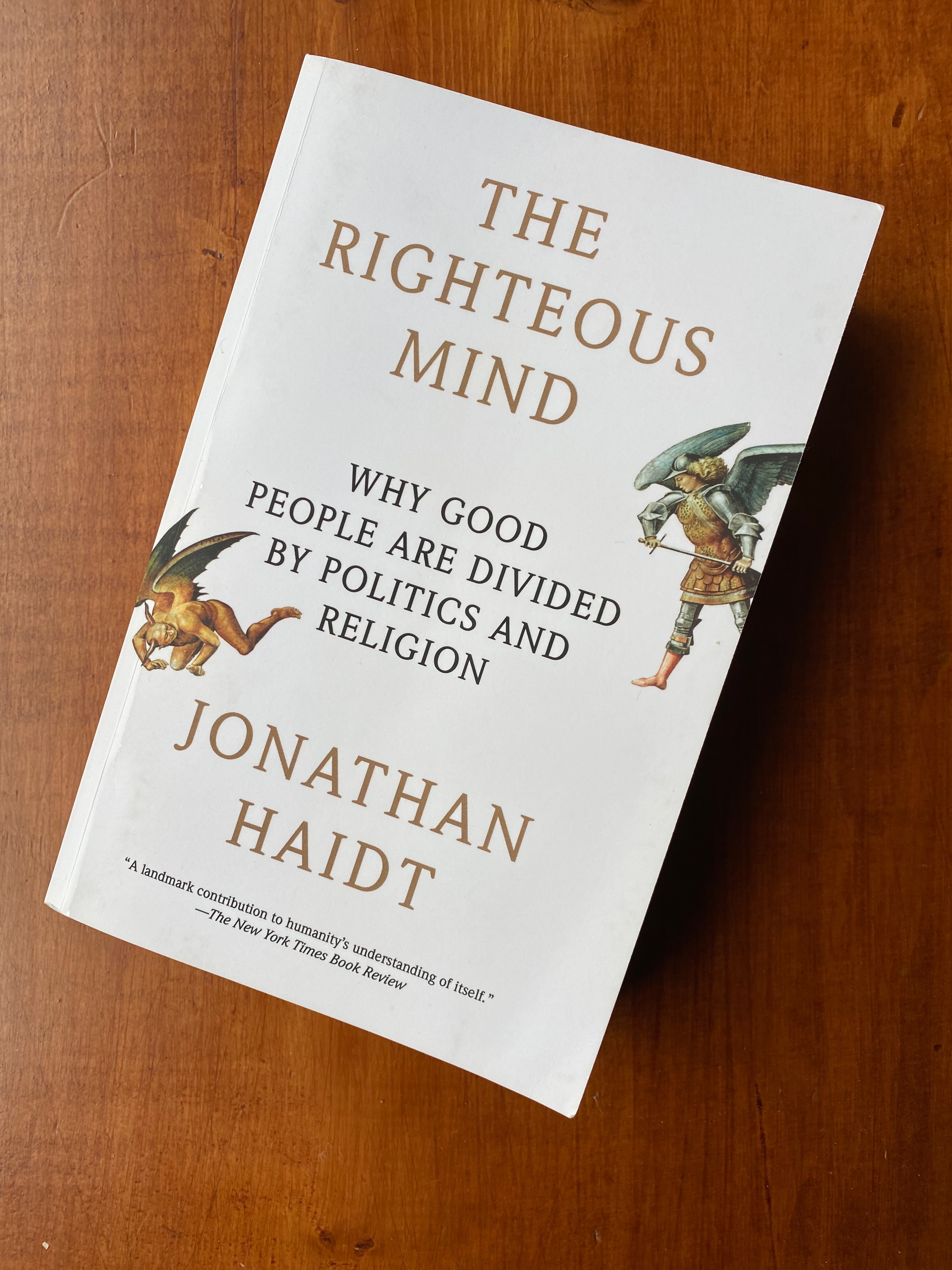In a political era that renders us painfully disconnected from one another, Jonathan Haidt offers some help. Informed by his studies of how politics and morality are entwined, he explores the very different world views that shape our political and moral decision-making. In his book, The Righteous Mind: How Good People are Divided by Politics and Religion, he describes how we arrive at moral judgments. His work shows what contributes to the chasm between people on the left and the right more clearly than anything I’ve encountered.

The first point Haidt makes is that we make our moral and political decisions instinctively. Only then does our analytical mind come along and construct the reasoned arguments that justify those moral and political choices. Haidt’s analogy is that reason is like the rider perched on top of an elephant. The elephant of instinct holds the power to set our direction.
This is why we don’t change each other’s minds with our clearly reasoned arguments. It’s helpful to remember that important decisions are made according to deep feelings about what matters most. Reasons don’t convince anyone. They simply explain or justify our decisions. If someone comes to see things in a new way, it’s because the change happens at a deeper level.
Haidt’s second major point is that human beings make moral judgments according to five main categories. Though all of us rely on these foundations of morality, some carry more weight than others, depending on the individual. The categories are:
Care vs. Harm
Fairness vs. Cheating
Loyalty vs. Betrayal
Authority vs. Subversion
Sanctity/Purity vs. Degradation
We use these categories to make sense of our experience and to determine what is right.
These categories affect everyone’s moral judgments, but we interpret behavior in relation to these categories differently. For example, both liberals and conservatives value fairness. Liberals tend to focus on fairness in terms of equality and social justice. The liberal idea of fairness is a level playing field. Conservatives tend to focus on fairness in terms of proportionality. The conservative sense of fairness is a society where people receive rewards according to the effort and contribution they make. Both liberals and conservatives value fairness, but their attention is directed to different aspects of what makes a system fair.
Liberals are most concerned with the first two categories of morality: care and fairness. Liberal political messaging generally addresses support and protection for vulnerable individuals, and creating a level playing field for everyone. The other three categories of moral decision-making do not carry the same import in the liberal mindset. Conservatives give more equal weight to all five categories. Conservative messaging includes the importance of loyalty to the group, respect for authority and the need for hierarchy in an orderly society, and the dignity and sanctity of human life. As Haidt points out, this gives conservatives an advantage in their political messaging. Speaking to all five moral categories offers more ways to connect with the priorities of individuals.
Haidt describes how studies of neurological structure reveal differences between the brains of individuals who describe themselves as liberal and as conservative. Neurological patterns of those who identify as liberal correlate with seeking and enjoying novelty and diversity in their experience, whereas those who identify as conservative show neurological patterns aligned with putting new ideas to the test and wariness of new experiences. A healthy society needs both perspectives, and thrives when these two propensities can be in conversation, determining through dialogue and debate how best to proceed.
Haidt offers further explanation of the difference between liberals and conservatives by examining three primary moral themes: autonomy, community, and divinity. Which is most important to you? Has it changed over time?
The moral theme of autonomy is central in what Haidt designates as WEIRD culture: Western, educated, industrialized, rich, and democratic. But in other parts of the world, and among conservative people in the West, community and divinity matter just as much as autonomy. In many cultures, community and divinity far outweigh autonomy in importance.
To create a society that effectively safeguards autonomy, the moral categories of Care vs. Harm and Fairness vs. Cheating matter most. Again, liberals who place the highest value on autonomy will be most concerned about the moral categories of Care and Fairness. On the other hand, to create a society that effectively safeguards community, the moral categories of Loyalty vs. Betrayal and Authority vs. Subversion are more important. Safeguarding a sense of the divinity of human life and society, makes Sanctity vs. Degradation the main priority. Once again, Loyalty, Authority, and Sanctity are categories of moral concern that resonate more strongly with conservatives, whereas WEIRD people focus mostly on Care and Fairness.
Seeing these fundamental differences in perception laid out so clearly has helped me understand more about my own moral and political values, as well as those of others. It has also made me more aware of what I hold in common with those whose politics are very different from mine. This is a welcome surprise, and perhaps even a way to find common ground. At a time when our nation is in such great need of the ability to work together, perhaps the non-judgmental insights Haidt offers can help us crack open the heavy doors of our ideological fortresses.
Haidt’s third major point is that human beings thrive when we are connected to others and feel part of something greater than ourselves. I’ll look at what he means by that in my next post.
